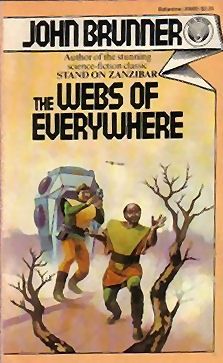 John Brunner wrote a variety of novels starting when he was 17. Some of the novels are important, many less so. The Webs of Everywhere is a novel that could have been important, but lacks focus to the point where, when the book is over, I found little in that would stick to the ribs.
John Brunner wrote a variety of novels starting when he was 17. Some of the novels are important, many less so. The Webs of Everywhere is a novel that could have been important, but lacks focus to the point where, when the book is over, I found little in that would stick to the ribs.
John Brunner tosses off sciencefictional ideas as though he had kept a bunch in his pocket and wanted to get rid of them. The Webs of Everywhere is full of them. First, the book begins with a device called a Skelter, which will allow immediate transportation between any two points. The impact of this invention is that the world changed. Whoever created the device forgot to put a lock and a doorbell on it and the result was a decade of anonymous crime and widespread spread of engineered disease that all but wiped out humanity.
Brunner reveals that cats are extinct, women are outnumbered by men three to one. Religion has undergone radical changes and society is very different when there is no limitation of distance.
This, it seems, would be enough be the basis for an important book comparing and contrasting this strange future with our own present. Instead, Brunner concentrates the story on a neurotic antique dealer who breaks into forgotten or forbidden skelters to retrieve artifacts from half a century earlier. This person’s strange obsessions and neurotic behavior sends the plot on a downward spiral that leads inevitably to an unsatisfying conclusion. Brunner, it seems, decided to put some ideas to paper, didn’t know where to go with it and then ended the novel.
My main complaint is that he left all those good ideas behind. For instance, there is a subplot where those that control the world’s economy are desperate to find good managers to help them with the task. They create a treasure hunt with increasingly difficult clues to discover people who are good at solving certain types of problems. Brunner doesn’t follow through with this great idea once it is introduced. Another subplot involves a blind Muslim poet who creates collectable books by hand. In a world where everything is mass produced these books are worth millions. It is a statement about the value of art that Brunner just drops and moves on to the next chapter.
As you read the novel you realize that in 1983 Brunner must have been smoking powerful amounts of dope. You want to yell at him, "Focus, John! Focus!".